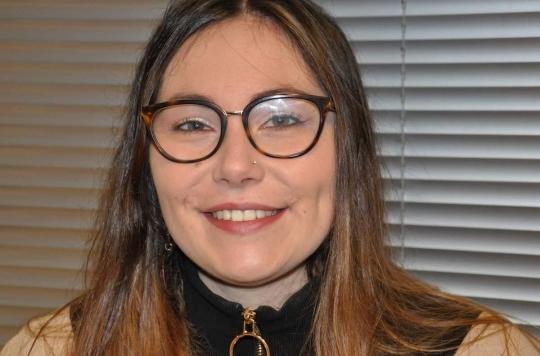As a parliamentary report pointed out in December 2020 which pointed to the “deleterious” effects that the coronavirus crisis had on them, young people are suffering. Why Doctor gives them the floor for a series of testimonials. Today, Marie Mesmeur, 26, social mediator who accompanies these young people at the University of Brest.

They belong to the categories least at risk from Covid-19 and yet they are also real victims of the health crisis. Upset student paths, complicated integration into the world of work, disappearance of many odd jobs and internships, precariousness, social life prevented: young people are doing badly. To the point that the government has set up a “psy check” so that they can benefit from support. For Why Doctor, they testify to the impact of this crisis on their daily lives and their mental health.
Marie Mesmeur is 26 years old. She is a social mediator in the student health service at Brest-Occidental University (UBO) and receives many students in individual interviews who talk about their distress.
– Why Doctor: What is wrong with the students you interview?
Marie Mesmeur: I observe an increased distress that has come through introspection. I was very afraid with the student suicides in Lyon or Brest of the contagious effect of the act which could invest the thoughts of other students. There are students who recognize themselves in this situation and they feel cornered by a situation of ill-being. At the end of the year, there was the adrenaline of partials but the effect after is the void. With the curfew, it’s very complicated. For us, the number of calls for psychiatric consultations has more than doubled. Today (the interview was conducted on Friday January 22, editor’s note), I was on the switchboard and two out of three calls were to request interviews with a psychologist. The problem is that we have 1.5 psychologists for 30,000 students and 3 hours of psychiatry per week. There is at least 3 weeks delay.
– Why do they feel in such a situation of distress?
They are in a very uncomfortable financial situation which has become dangerous and morbid. This situation plunges them into permanent anguish and makes them lose all meaning. Students tell me that they no longer leave their homes, that they stay in bed since all their courses are done remotely. They don’t feel like eating anymore and anyway they don’t necessarily have the money to eat well. In the evening, they chain movies to relax. Their only point of contact is the computer, from 8 a.m. to 1 a.m., every day. There is both disconnection and over-connection. The situation is very stressful.
Recently, a student launched a questionnaire for all Literature students in Brest. The first results, which relate to 1,300 responses out of the 6,000 expected, show that 19% of students say they have had suicidal thoughts in the last few days.
There are many students who fall ill because they don’t turn on the heating for lack of means. There are also a lot of ophthalmic migraines because of the time spent on screens. Others have toothaches that they cannot treat because the dentist is too expensive. They don’t feel listened to and singled out because they are young. During his last press conference, Emmanuel Macron was ironic about the fact that young people are only waiting for one thing: the reopening of bars. But their concerns are not there. They fear for their physical and moral health, and their future. Precariousness is multi-dimensional.
– What support is there for these students?
There are volunteer students who help with the use of the law and who follow up requests for mutual insurance or CAF for those who need it. They end up doing more and turning into makeshift psychologists. There is also a nurse who has been granted time to be able to listen because there is really a lot of demand. Another nurse does sophrology or plantar reflexology. Another does self-hypnosis sessions. There are three social workers available for the 30,000 students. It’s not a lot. We also have a psychiatrist but the next appointment is March 2. For psychologists, it’s February 9, but when students hear the deadline, many give up.
– Do you feel that the psychological situation of the students is deteriorating?
I feel that mentally it is getting worse and worse. They are on edge. I was recently with a student that I have known for a long time, who is very cheerful and open in nature. Her eyes filled with tears just after hearing the word confinement. The students are feverish, exhausted. They smile less than usual. They need to talk, get it out.
– What are they waiting for?
They just want a moment of exchange with someone. They want to get out of their financial precariousness, no longer have to think about money or their family. Above all, they need to talk about themselves. After my interviews, one out of two students sends me a thank you email explaining that speaking has done them good.
Otherwise, the main concern is the financial, especially during the winter with heating and food which bring comfort and which they deprive themselves of.
Lately, we have heard a little more about the students. There is a feeling of “we are finally being talked about” but they are afraid that it will end overnight. They are afraid of the announcement effect. There is extreme anxiety that a new confinement will make all this stop and that they will find themselves alone again. A third confinement seems to them difficult to bear.
– Do they manage to plan for the longer term?
There are several profiles: those who have already stopped, those who want to reorient themselves and those who survive and let themselves be carried away by the situation. What is complicated is for students who are in the last year of their Bachelor’s degree and who are about to go on to a Master’s degree. They have a truncated License, they don’t know where to go, whether they should keep their apartment or not, for fear of not finding another one. There are also those who are in their second year of Masters who must enter the job market. They already can’t find an internship so they tell themselves that it will be the same thing to find a first job. Then there are those who want to go abroad. For some it is compulsory in their course and they say to themselves that they will have to repeat a year.
Foreign students are the most precarious and the most present in university residences. It’s been a year since they’ve seen their families and for some they hardly know anyone. The lessons are very complicated for them because French is not their mother tongue. They also have visa problems. Many have received receipts to receive visas but the delay is only 3 months and the delays have become crazy in the Prefecture and they find themselves in a situation of irregularity. In addition to this fear, they have no health insurance, no CAF, no rights because they don’t have an up-to-date visa. They cannot receive APLs. They do not seek care. In addition to having nothing, they are alone in a foreign country. And these are the ones with the least housing and internships.
– How do students view the future?
They have the feeling of going after everyone, whether for the vaccine or the deconfinement. They have integrated that they will be precarious for a long time and that knocks them out. Even though there are exchanges between students, there has never been so much sense of individuality. If we have to get better, succeed, we will have to fight because nothing is given to them, whether it be internships or social assistance. For some, it is a personal shame to seek help. There are some who come and collapse saying that coming to see us is their last resort. Taking this step is an awareness that is violent. Students have asked us to accompany them to food banks because they are ashamed. It’s real. There are also things that I was not asked before, such as correcting cover letters. It’s not my job but they no longer have confidence in themselves and no longer know where to turn. They felt strong in their youth, in the future and had plans, but all that was replaced by the emptiness of the present moment and anxiety about the future. It’s complicated today to make sense of student status.
– And you, how do you manage to keep your footing while listening to this student distress on a daily basis?
I try not to think about it. I chain worrying cases. I hear sadness, suffering, I see eyes crying, hands shaking, others who haven’t had hot water for 2 months… I’m worried because I’m linked with many of them. I am happy that many do not hesitate to contact me, write to me when things are not going well. So it’s complicated. When I see them questioning everything, I understand them, I’m like them and it’s very hard. It’s sad but this work of recognition I see that it does them good so it does me good. I have the impression that when we talk about students, we are talking about skeletons but they are humans who face a lot of things. I’m in a team so we can talk about it but sometimes we are stunned by a little hard news. We have feelings of injustice, as for those who do not have a visa. I spend all my free time helping them.
.















